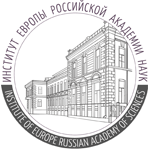institute of europe
the institute of europe of the russian academy of sciences
Announcement of Publication on Covid-19 Epidemics in the UK and Russia
- 11 May 2021
An informative and balanced article comparing the health systems in the UK and Russia during Covid-19 epidemics by Christopher Davis, a regular academic visitor to the Institute of Europe (Russian Academy of Sciences), professor at Oxford University and, was published on 27 April 2021 (see notice below).
Christopher obtained a B.A. in Applied Mathematics from Harvard University and a Ph.D. in Economics (1980) from Cambridge University for his dissertation on The Economics of Health in the USSR. He spent the 1976-77 academic year in the Faculty of Economics of Moscow State University on the USA-USSR exchange program engaged in doctoral research, where he obtained supplemental supervision from the then leading Soviet health economist, Professor Georgii Alexeevich Popov. In the 1980s Christopher made two extended visits for postdoctoral research to the Central Economic-Mathematical Institute AS USSR and co-edited a 1989 book entitled Models of Disequilibrium and Shortage in Centrally Planned Economies. Since 2013 his research on health economics has been supported by two part-time research positions at the Russian Presidential Academy of the National Economy and Public Administration (RANEPA) and the Higher School of Economics (HSE).
*****************************************************

On 27 April 2021 the journal Post-Communist Economies published an article by Christopher Davis, Professorial Research Fellow at the Oxford Institute of Population Ageing, entitled:
Readiness and resilience of the health systems of the UK and Russia during Covid-19 epidemics in 2020-2021: impacts of priorities, shortages and rationing
The publisher Taylor & Francis has made the article available through Free Access because it analyses Covid-19 epidemics
ABSTRACT: The Covid-19 pandemic in 2020-2021 generated almost universal shocks to the interrelated complex systems of politics, society, economy, social care and health. The objectives of this article are to analyse health systems conceptually (section two) and empirically (case studies of the UK and Russia) in order to understand: their interactions with the other four complex systems; their readiness for the Covid-19 epidemics and resilience in coping with its challenges; and the impacts on them of changes in health priorities, shortages, and rationing. Evaluations are made in section three of the readiness of the UK and Russia health systems in January- February 2020 and in section four of their resilience during the First Wave (March-June). Section five assesses developments in readiness in July-August for the Second Wave and then evaluates the resilience of the health systems during September 2020 to February 2021. The concluding section discusses the mass vaccination programmes and continuing challenges in 2021.
A related earlier article by him analyses the causes of the initial conditions in the UK and Russia health systems in early 2020:
Davis, C. (2020, September) Priorities, shortages, and rationing in the UK and Russia national health services during 2000–2019: Initial conditions for responses to Covid-19
Post-Communist Economies, 32(8), 969–1010.
Available Free Access at: https://doi.org/10.1080/14631377.2020.1800317
